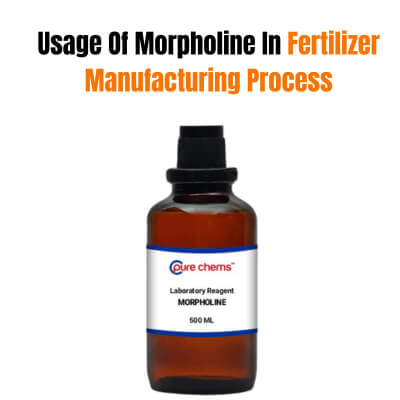
Morpholine, a heterocyclic organic compound with a variety of industrial applications, is a chemical that can increase the efficiency of fertilizers. It has special chemical properties that can ensure that plants grow stronger and healthier while keeping the soil in good condition. By using Morpholine in fertilizers, we can make sure that the plants get the nutrients they need to grow well and increase the harvest. It also helps the soil stay healthy by holding onto water and letting air in for plant roots. Using morphine in fertilizers is also good for the environment because it keeps nutrients in the soil and prevents them from washing away into rivers and lakes.
Morpholine plays an important role in fertilizer manufacturing. With its unique chemical properties and potential agronomic benefits, morpholine enhances soil fertility and crop productivity while promoting sustainable agricultural practices.
The process of incorporating morpholine into fertilizer manufacturing involves several key steps, each contributing to the development of high-quality fertilizers tailored to meet the diverse needs of modern agriculture.
Morpholine is primarily synthesized through chemical reactions involving ammonia and diethylene glycol. This synthesis process yields morpholine as the principal product, which serves as the foundation for morpholine-based fertilizers. The synthesis is typically conducted under controlled conditions to ensure the purity and consistency of the final product.
Once synthesized, morpholine is incorporated into fertilizer formulations to manufacture balanced nutrient blends suitable for different soil types and crops. Morpholine acts as a carrier for essential nutrients, facilitating their uptake by plants and promoting healthy growth. Morpholine-based fertilizers contain varying concentrations of nitrogen, phosphorus, potassium, and micronutrients.
1. Nutrient holding properties
Morpholine's unique property of combining with metals like iron, zinc, and manganese forms strong bonds. These bonds prevent essential nutrients from being washed away in water and help plants utilize them effectively for growth.
2. Soil Conditioning:
In addition to its role as a nutrient carrier, morpholine contributes to soil conditioning by improving soil structure and water retention capacity. The presence of morpholine in fertilizers promotes the aggregation of soil particles, leading to better aeration, drainage, and root penetration. This, in turn, creates a favorable environment for microbial activity and nutrient cycling, fostering long-term soil health and productivity.
3. Environmental Sustainability:
Morpholine-based fertilizers offer several environmental benefits compared to conventional fertilizers. By promoting efficient nutrient utilization and minimizing nutrient runoff, morpholine helps mitigate the risk of water pollution and eutrophication. Furthermore, the slow-release properties of Morpholine-based fertilizers reduce the need for frequent applications, thereby lowering greenhouse gas emissions associated with fertilizer production and transportation.
The Order, 2020, published by the Ministry of Chemicals and Fertilizers, Department of Chemicals and Petrochemicals, heralds a new era in agricultural innovation by endorsing the integration of morpholine into fertilizer manufacturing. As Morpholine continues to gain recognition for its agronomic benefits, adherence to regulatory guidelines and quality control standards will be essential for realizing its full potential in promoting sustainable agriculture and food security. By harnessing the power of Morpholine, farmers can cultivate healthy soils, robust crops, and thriving ecosystems, paving the way for a more sustainable and resilient agricultural future.
The rules in the Order, 2020, from the Ministry of Chemicals and Fertilizers, Department of Chemicals and Petrochemicals, for using Morpholine in farming are like this:
For Registration Visit: Fertilizer Manufacturing & Trading License
1. Pollution Control Board Certificate
The Pollution Control Board Certificate is permission from the State Pollution Control board that the fertilizer plant is following the guidelines issued by the State Pollution Control Board. The manufacturing plant meets environmental standards and complies with pollution control measures. This certificate serves as proof that the facility's operations are not causing harm to the environment, including air, water, and soil quality.
2. Fertilizer Manufacturing License from the Agriculture Department
This license is issued by the Agriculture Department or its designated authority. It grants permission to manufacture fertilizers and ensure compliance with agricultural regulations and standards. The department conducts regular inspections and reviews the manufacturing processes to verify adherence to quality control measures, labeling requirements, and safety protocols. Obtaining this license signifies that your fertilizer products meet the necessary quality standards and are suitable for agricultural use.





We are the pioneers in offering environmental consulting services to our patrons, giving us the first mover advantage & keeping us ahead of our competitors.
Very experienced in filing, monitoring & submission of CDSCO Compliances, Drugs Manufacturing & sale guidelines, Environmental Impact Assessment, AERB consulting services, Pollution Control Board CTE & CTO Advisory Services, Waste Management Authorization from State Pollution Control Boards, Fertilizers & Insecticides Manufacturing, Wholesale & Import Compliances
